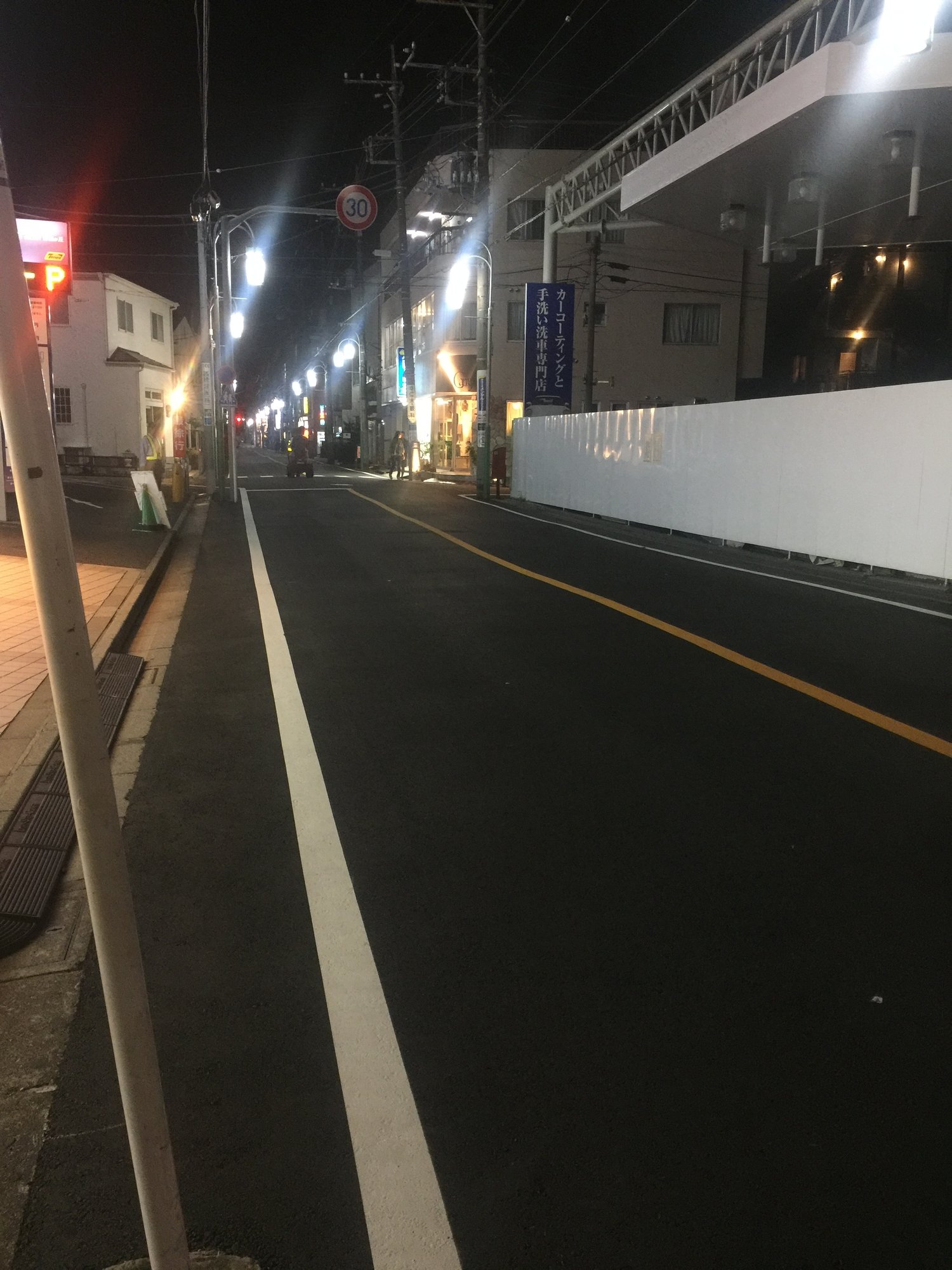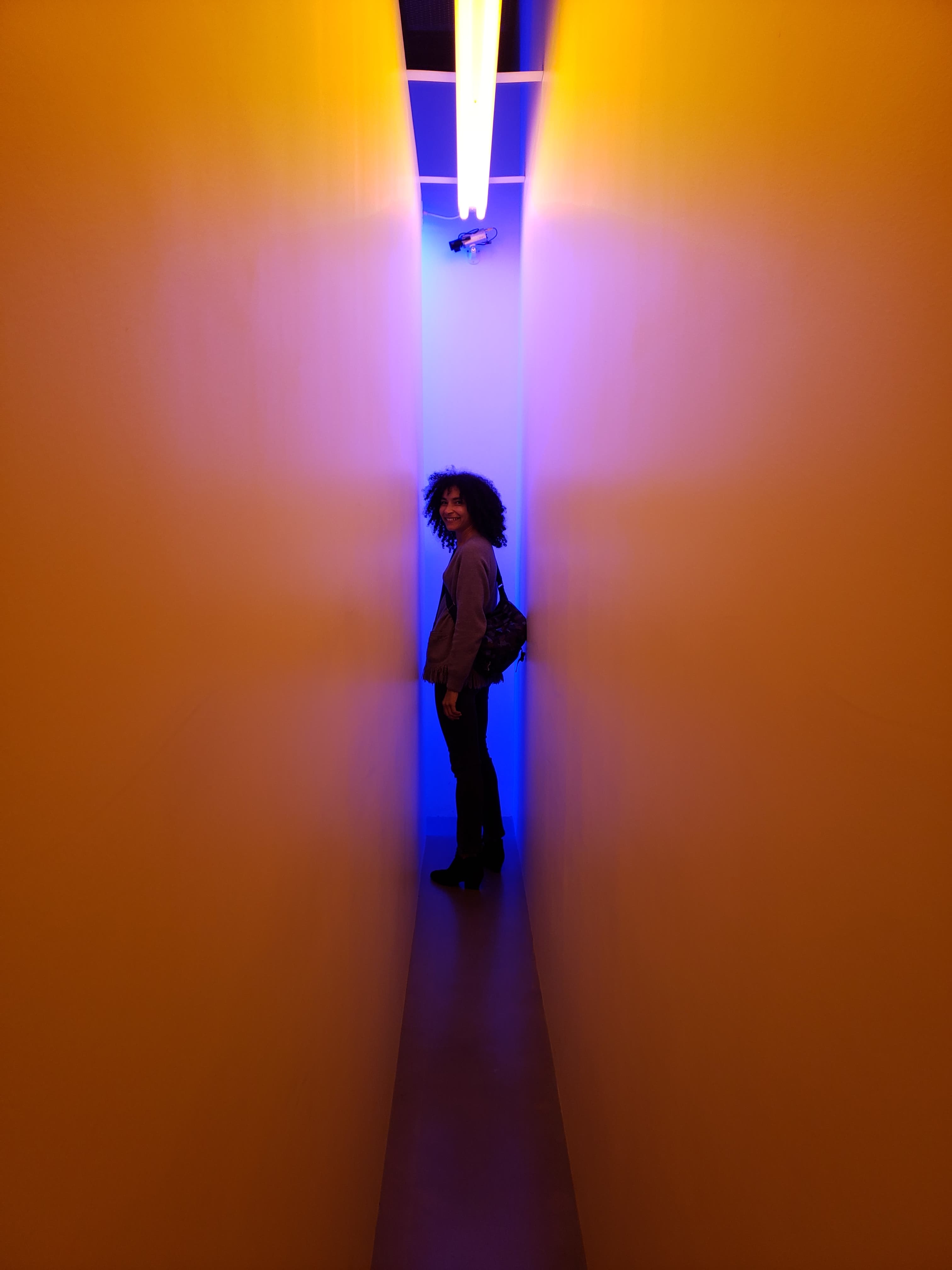Leaving You
1: Komazawa Olympic Park
July 5, 2018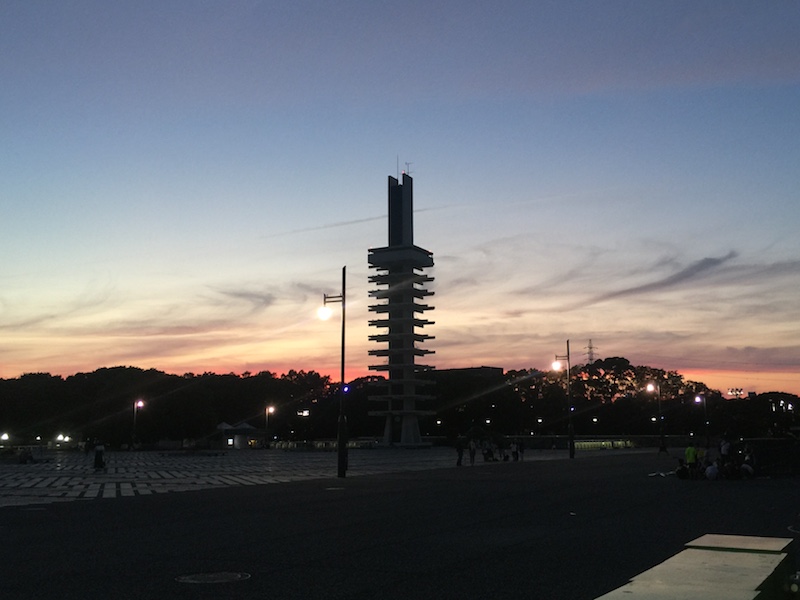
Let's start at the very heart of my Tokyo existence.
The week I moved here, I asked my Oya (landlord) family if there was a park nearby. At that time, I had been running a lot. They pointed me in the right direction and still I missed it.
On the second stab, I found exactly what I was looking for: 60s brutalist concrete architecture, a two km running loop, trees and an indie cafe the likes of which I had not yet found in my neighborhood.
It has been a long and glorious affair, Komazawa Olympic Park. I began seeing you daily when I was young and single. I'd run through you in the daytime and, having discovered walking through a park at night was still, for the most part, quite safe, I began sneaking kisses in the evening as well. It was those evening meetings that were especially sweet; as an American woman, freely walking about a park at night is something akin to casually robbing a bank.
I remember traversing your bare expanse of plaza, pressing my back into the cool of your marble benches in the torrid evenings Tokyo summer, noting that somehow, a breeze was generated that would pour up from my feet and over my head. That, looking up with my head in your lap, it was the only place I from which I could view the sky without accidentally peripherally being forced to acknowledge the teaming buildings surrounding us.
This went on for years.
The week I moved here, I asked my Oya (landlord) family if there was a park nearby. At that time, I had been running a lot. They pointed me in the right direction and still I missed it.
On the second stab, I found exactly what I was looking for: 60s brutalist concrete architecture, a two km running loop, trees and an indie cafe the likes of which I had not yet found in my neighborhood.
It has been a long and glorious affair, Komazawa Olympic Park. I began seeing you daily when I was young and single. I'd run through you in the daytime and, having discovered walking through a park at night was still, for the most part, quite safe, I began sneaking kisses in the evening as well. It was those evening meetings that were especially sweet; as an American woman, freely walking about a park at night is something akin to casually robbing a bank.
I remember traversing your bare expanse of plaza, pressing my back into the cool of your marble benches in the torrid evenings Tokyo summer, noting that somehow, a breeze was generated that would pour up from my feet and over my head. That, looking up with my head in your lap, it was the only place I from which I could view the sky without accidentally peripherally being forced to acknowledge the teaming buildings surrounding us.
This went on for years.
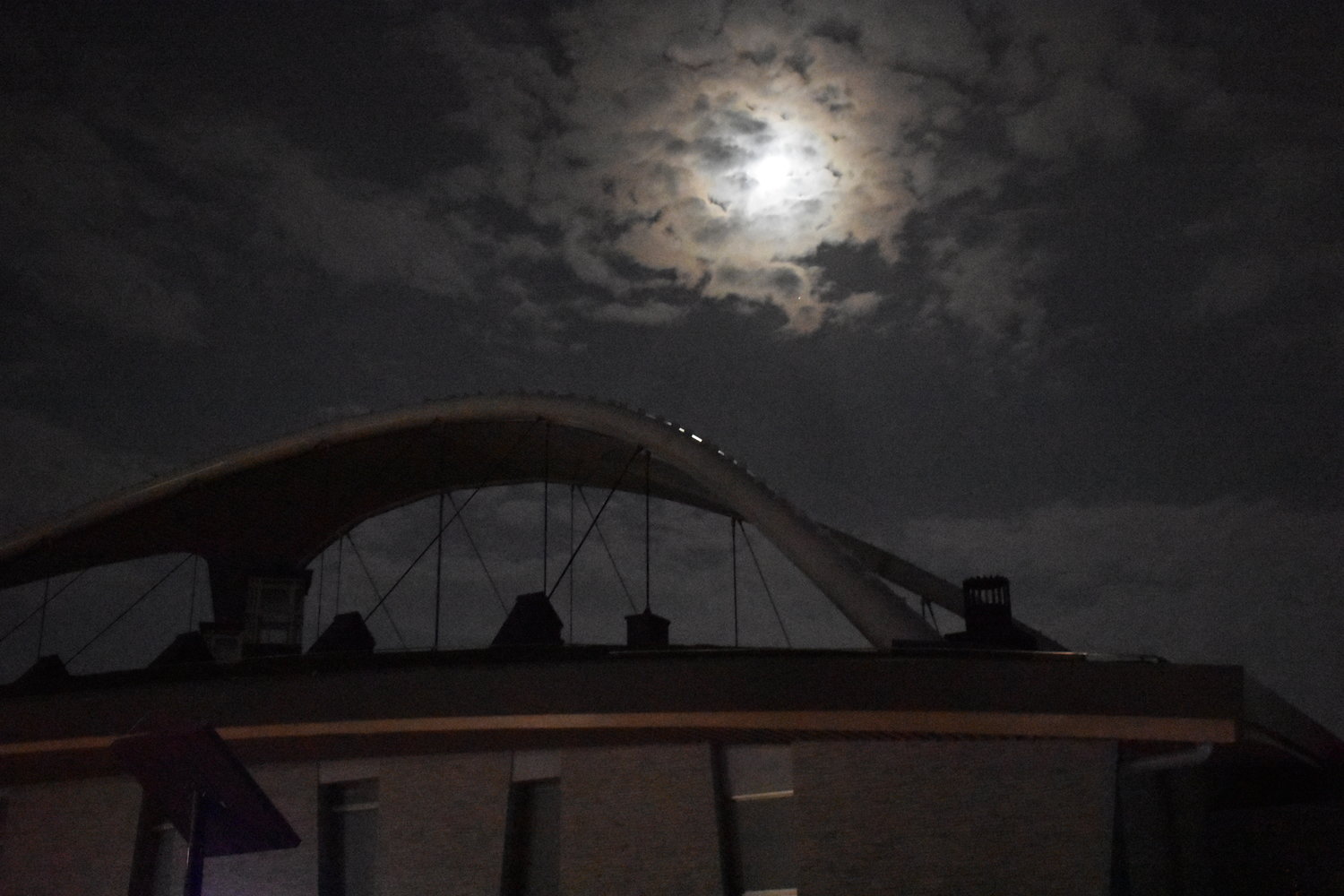
We broke up once, when I first married and moved away. We didn't fight, but for some time, we didn't see much of each other. We drifted in and out of separate circles. I thought of you often, but I knew I wouldn't be able to commit.
![]()
A short while later, my family moved to your opposite border, and almost immediately, our relationship was rekindled. Near daily visits, nightly rendezvous.
I looked on as your pool collected radiation from Fukushima and was summarily shut down for good.
I watched pick up games on your courts. I avoided the spiders in the corners of your restrooms.
I was comforted by the sounds from your skate park.
You supported me as I trained for two marathons--you didn't seem to mind my tracing the same path on your chest hundreds upon hundreds of times.
It's been 16 years since we first met, and you still look as good to me, feel as good to me, as you did back then.
My love, thank you for watching over me.
![]()
Here's the one that made me really pay attention for the first time. I had already been in Japan for at least five years, when walking past an Aoyama Dori drug store I noticed![]()
So then, I started keeping my eyes peeled. And quickly discovered
![]()
![]()
![]()
![]()
![]()
Not long into my relationship with be not-yet husband, we went to an exhibition of the work of Laurie Anderson. I believe it was at ICC Gallery in Shinjuku. We were going to exhibitions nearly every week, and found we had very similar tastes and ways of understanding art.
At a certain point, we got to a piece that I enjoyed, that he just didn't get. It was a series of black and white photos of people sleeping in public. I was still relatively new to Japan, and still hadn't gotten over Tokyoites penchant for sleeping just about anywhere.
No matter what cafe you went to, there would be at least one person face down. Most often at Starbucks (which would probably garner a visit by the police in the US, depending on the color of your skin).
On any bus, for certain. On the train, well, there are several levels of train sleep.
There's the I ran onto the train, pushed an old lady out of the way and dove in front of a pregnant woman for this seat and am pretending to sleep so I don't have to give it up for anyone sleep. This is the most popular, most often enjoyed by able-bodied men in their 30s and 40s.
There is the I am so damn tired I can't hold my head up so I've got my head on the next passenger's shoulder and I don't even know it but will be totally mortified when I wake up and find out sleep. I am on the receiving end of such affection about once or twice a year. Mostly the very young, especially upper middle class teens made to endure endless hours of study. Occasionally, young businesspeople who haven't yet figured out the work-life balance thing.
Then there's the I have been on a bender sleep. Most often committed by middle aged men in suits. See example below
![]()
This happens with increasing frequency during Cherry Blossom season and in December, when most companies have mandatory year end parties.
I really do quite enjoy what I call the "blue collar siesta". It's quite hard to snap photos of these, as Japanese phones all have an incredibly loud shutter sound to discourage upskirting. But oftentimes, at a construction site or similar, you'll peep a gaggle of uniformed lads who, having just refueled on lunch, are napping like an array of gentle giant kittens on a tarp.
I got this one guy from afar. He must be a road construction worker, as he is wearing the nifty vest.
![]()
So the real reason my soon-to-be husband didn't get what was so funny in the art about public sleeping was because there is nothing funny about public sleeping.
A quick Google search proves the Japanese are champions at it.
4: Shibuya Be Like
July 16, 2018
Generally, I don't enjoy being in Shibuya at all. All of the reasons people flock (my younger self included) are now the reasons I flee. More on that later. Just, last Friday evening as I passed through, I remembered to look up and saw
![]()
![]()
![]()
No filters, no editing, no nothing.
I feel like I should shake the hand of my opponent. Well played, Shibuya.
The relative safety of life in Japan will be a recurrent theme. Crime is really, really quite low. Most violent crime, for better or for worse, is confined to the yakuza or is committed by family members (and some of it quite extreme).
But for the most part, we don't have to look over our shoulders. Wallets in back pockets basically stay there, are not removed by anyone other than their rightful owners.
And there is something quite magical that happens when our possessions try to wander off on their own.
![]()
This is my card case. It has identified as mine for at least 10 years, if not more. My friend Patrick Stephan designed it, and he hasn't lived here in Japan for years and years.
Though it has been mine for 10 years, it probably has been in my possession for about nine years.
I have lost it many times. It has wandered off like an outdoor cat, lived a different life for awhile and then come back to me. Always.
It's pretty significant that in Japan, if you leave your phone on the train (did it) or in a taxi (friends did it) or your laptop in a taxi (friend did it) or your shoemaking gear on the top rack of the subway (totally did that), 9 times out of 10, you will be reunited with it. Kind souls bring your lost material children to the police boxes and lost and found. They hang stray keys on fences, lonely solo baby shoes on post boxes. Wallets come back with cards and sometimes even cash untouched.
My card case went for a walk sometime in early 2011 and failed to come home. It had run away before and come back. I had counted my blessings then, but as time passed, I became less and less hopeful.
The great earthquake came and kind of changed everything forever (that's a different post). I actually forgot about the case.
That summer, typhoon season ramped up pretty early. One had just battered through town, dumping a deluge of rain and blustery winds. It was July. The day after a typhoon is always clear and very, very hot. I took the 8-min walk to the subway very slowly, so as not to open the sweat spigot full blast. And then I came upon this
![]()
Perched atop a hip high garden lamppost, was my card case. Exactly like this. It was damp, and the cards inside were all worthless. But still, it was there! In a place I passed twice every weekday.
I still do not know what amount of kismet was necessary to make our reunion a reality. I don't know if the neighbors who had seen me pass on the way to work guessed the case belonged to me because of my foreign name. I still don't know what kind of adventure the case had been on for all of that time. It would have been impossible that the case had been there longer than a few hours; it would have been blown into the bushes by the previous day's storm.
No matter. We are still together because of the honesty and thoughtfulness of the 37.8 million people I share the Tokyo metropolitan area with. Go figure.
![]()
One small glass box on each platform is climate controlled.
Quite often, you'll hear people say a compound word "Heiwa sugiru". Translated most literally, it means too much peace, or too peaceful. It is a lucky thing to complain about! Usually, it is trotted out when talking about Japan's supposed fading relevance. Punctuates the odd story that will make headlines because well frankly, there isn't a whole lotta bad shit going down all the time.
Today's case in point
![photo courtesy of FNN Prime News, via Yahoo! Japan]() photo courtesy of FNN Prime News, via Yahoo! Japan
photo courtesy of FNN Prime News, via Yahoo! Japan
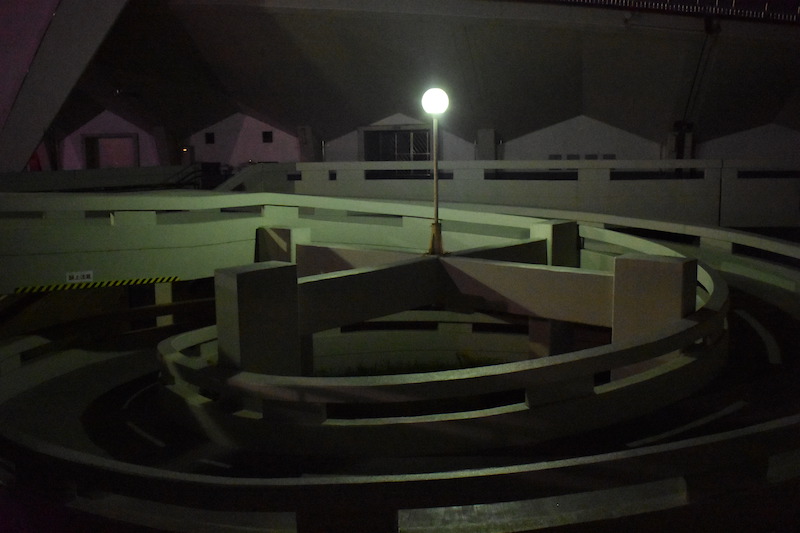
A short while later, my family moved to your opposite border, and almost immediately, our relationship was rekindled. Near daily visits, nightly rendezvous.
I looked on as your pool collected radiation from Fukushima and was summarily shut down for good.
I watched pick up games on your courts. I avoided the spiders in the corners of your restrooms.
I was comforted by the sounds from your skate park.
You supported me as I trained for two marathons--you didn't seem to mind my tracing the same path on your chest hundreds upon hundreds of times.
It's been 16 years since we first met, and you still look as good to me, feel as good to me, as you did back then.
My love, thank you for watching over me.
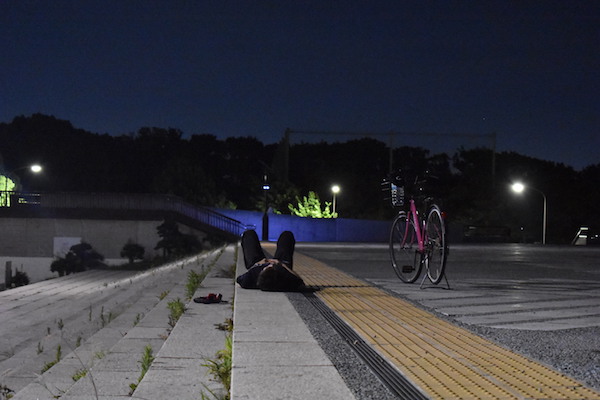
2: Toilet Paper
July 6, 2018Here's the one that made me really pay attention for the first time. I had already been in Japan for at least five years, when walking past an Aoyama Dori drug store I noticed
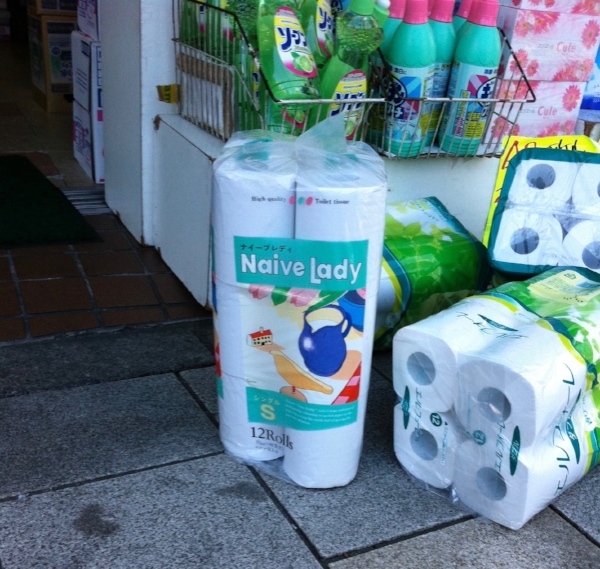
So then, I started keeping my eyes peeled. And quickly discovered
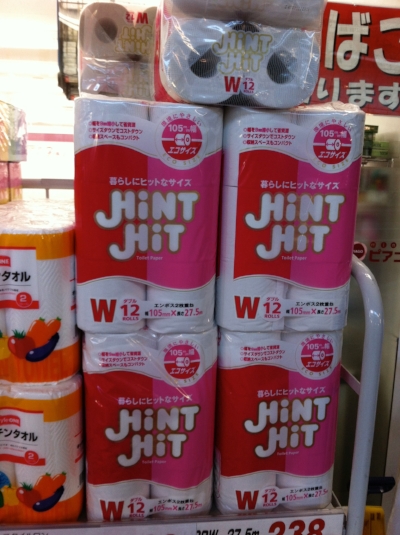

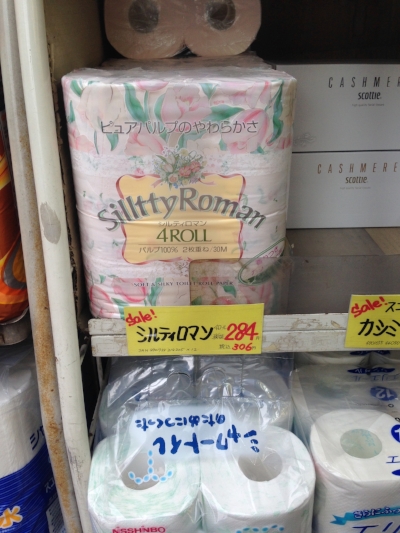

3: Sleep
July 15, 2018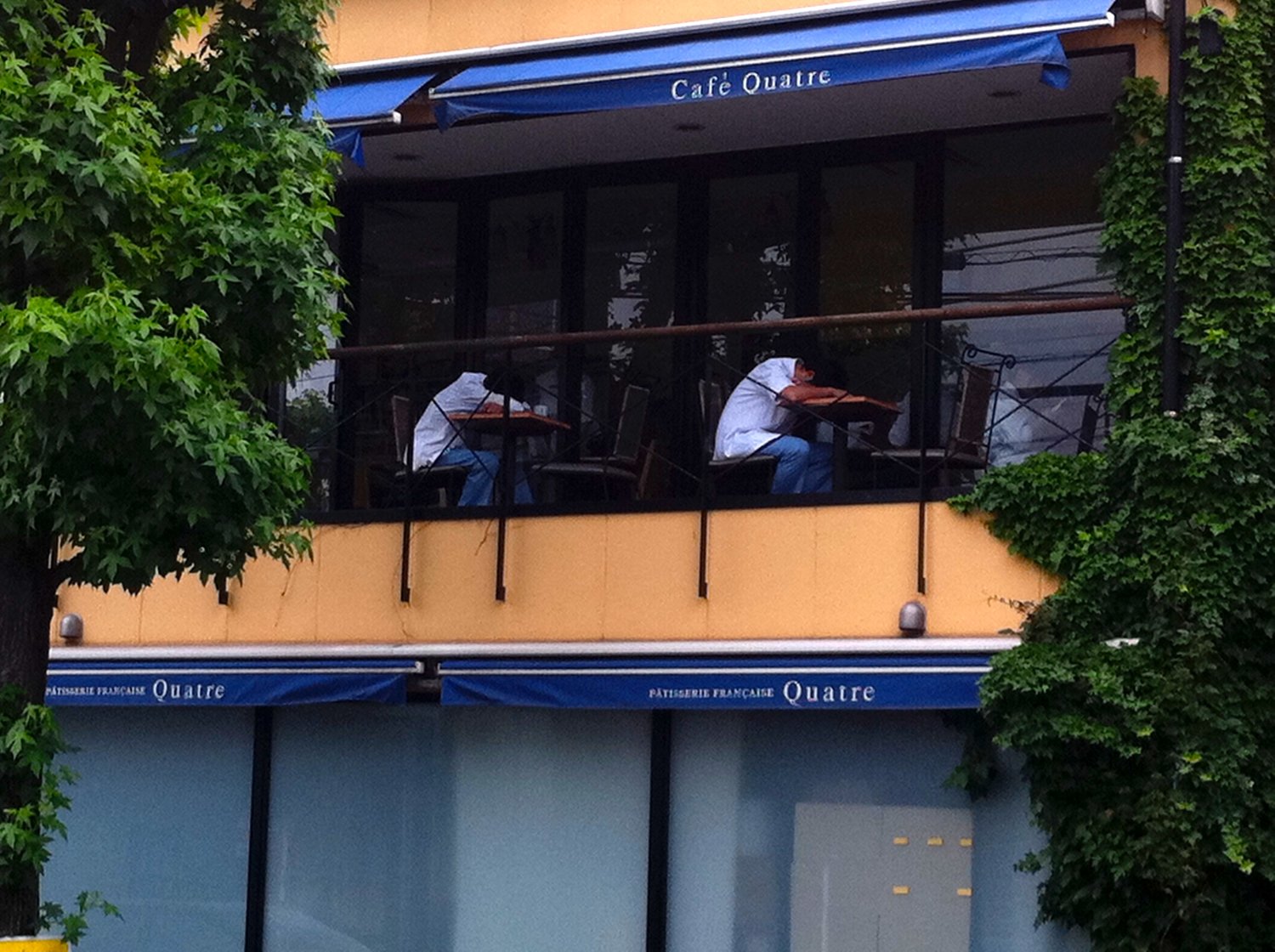
Not long into my relationship with be not-yet husband, we went to an exhibition of the work of Laurie Anderson. I believe it was at ICC Gallery in Shinjuku. We were going to exhibitions nearly every week, and found we had very similar tastes and ways of understanding art.
At a certain point, we got to a piece that I enjoyed, that he just didn't get. It was a series of black and white photos of people sleeping in public. I was still relatively new to Japan, and still hadn't gotten over Tokyoites penchant for sleeping just about anywhere.
No matter what cafe you went to, there would be at least one person face down. Most often at Starbucks (which would probably garner a visit by the police in the US, depending on the color of your skin).
On any bus, for certain. On the train, well, there are several levels of train sleep.
There's the I ran onto the train, pushed an old lady out of the way and dove in front of a pregnant woman for this seat and am pretending to sleep so I don't have to give it up for anyone sleep. This is the most popular, most often enjoyed by able-bodied men in their 30s and 40s.
There is the I am so damn tired I can't hold my head up so I've got my head on the next passenger's shoulder and I don't even know it but will be totally mortified when I wake up and find out sleep. I am on the receiving end of such affection about once or twice a year. Mostly the very young, especially upper middle class teens made to endure endless hours of study. Occasionally, young businesspeople who haven't yet figured out the work-life balance thing.
Then there's the I have been on a bender sleep. Most often committed by middle aged men in suits. See example below
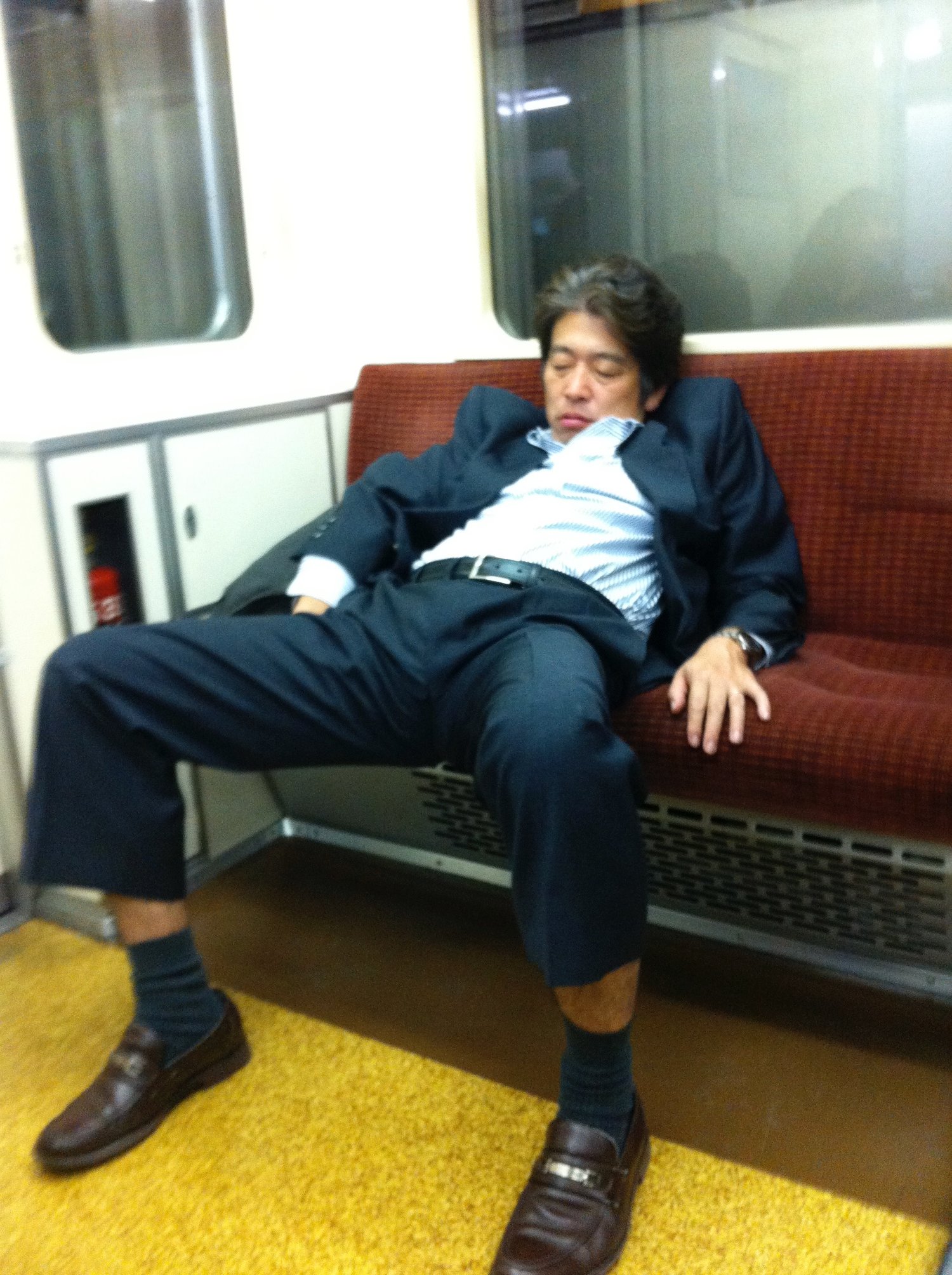
This happens with increasing frequency during Cherry Blossom season and in December, when most companies have mandatory year end parties.
I really do quite enjoy what I call the "blue collar siesta". It's quite hard to snap photos of these, as Japanese phones all have an incredibly loud shutter sound to discourage upskirting. But oftentimes, at a construction site or similar, you'll peep a gaggle of uniformed lads who, having just refueled on lunch, are napping like an array of gentle giant kittens on a tarp.
I got this one guy from afar. He must be a road construction worker, as he is wearing the nifty vest.
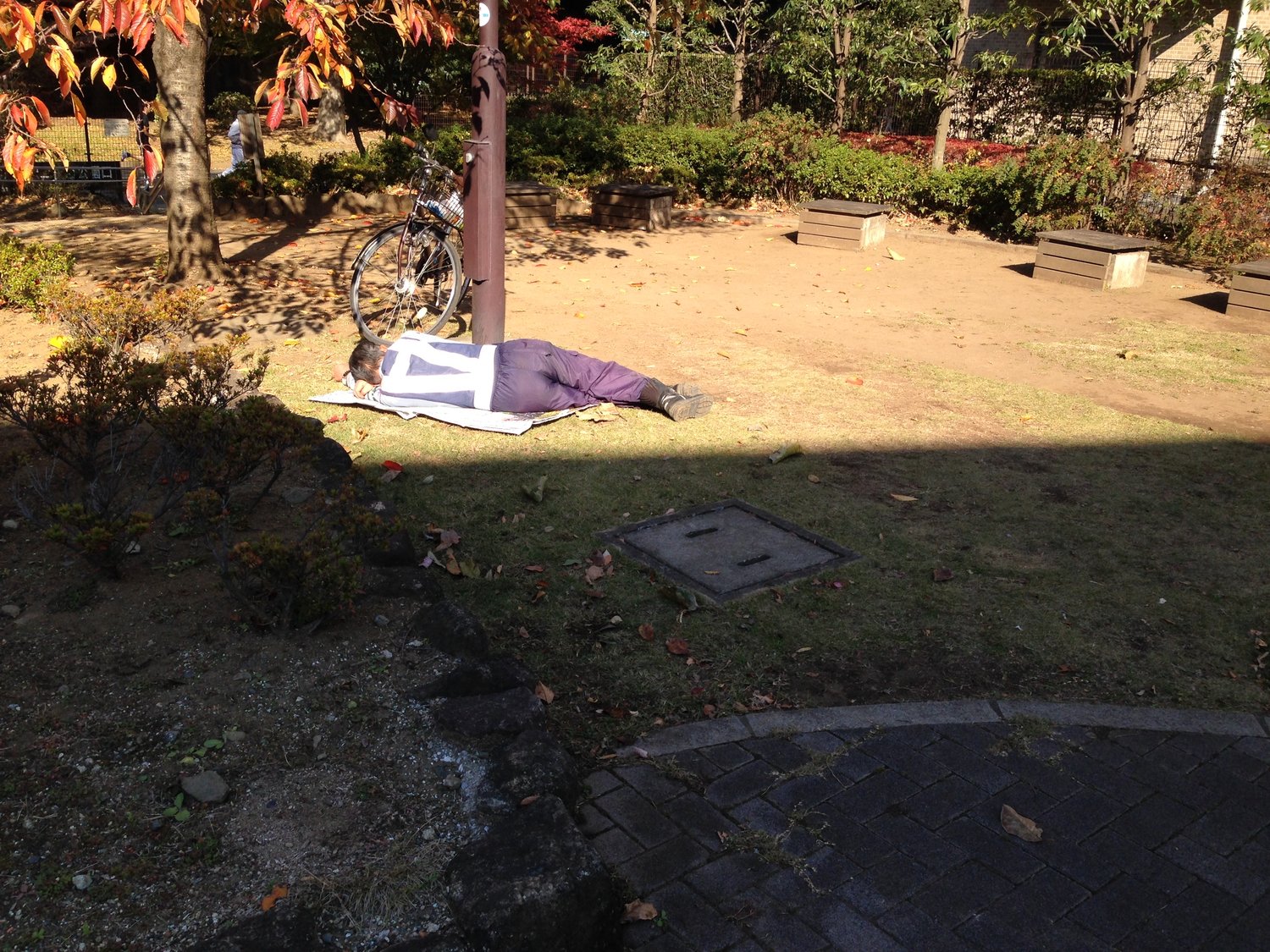
So the real reason my soon-to-be husband didn't get what was so funny in the art about public sleeping was because there is nothing funny about public sleeping.
A quick Google search proves the Japanese are champions at it.
4: Shibuya Be Like
July 16, 2018Generally, I don't enjoy being in Shibuya at all. All of the reasons people flock (my younger self included) are now the reasons I flee. More on that later. Just, last Friday evening as I passed through, I remembered to look up and saw
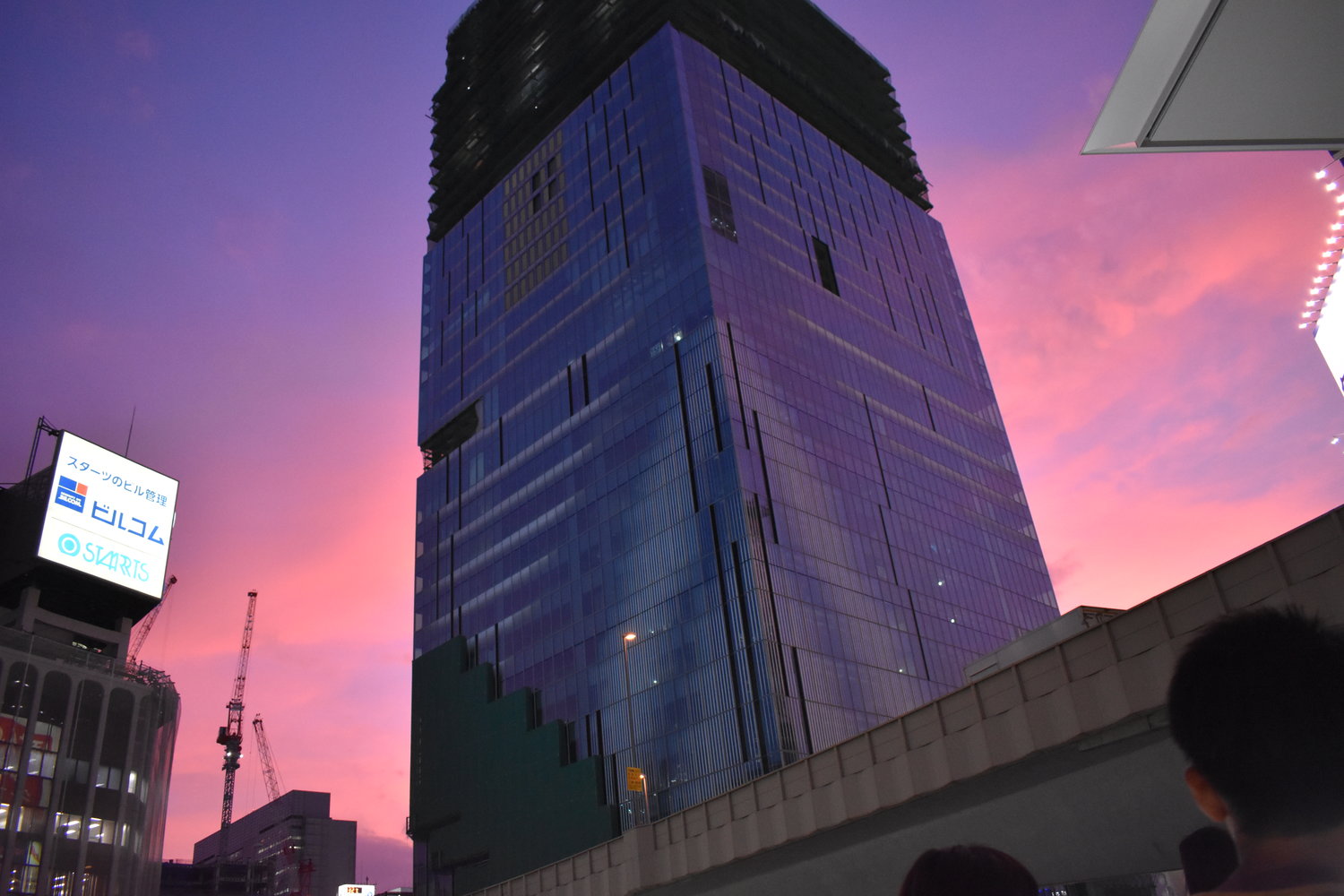
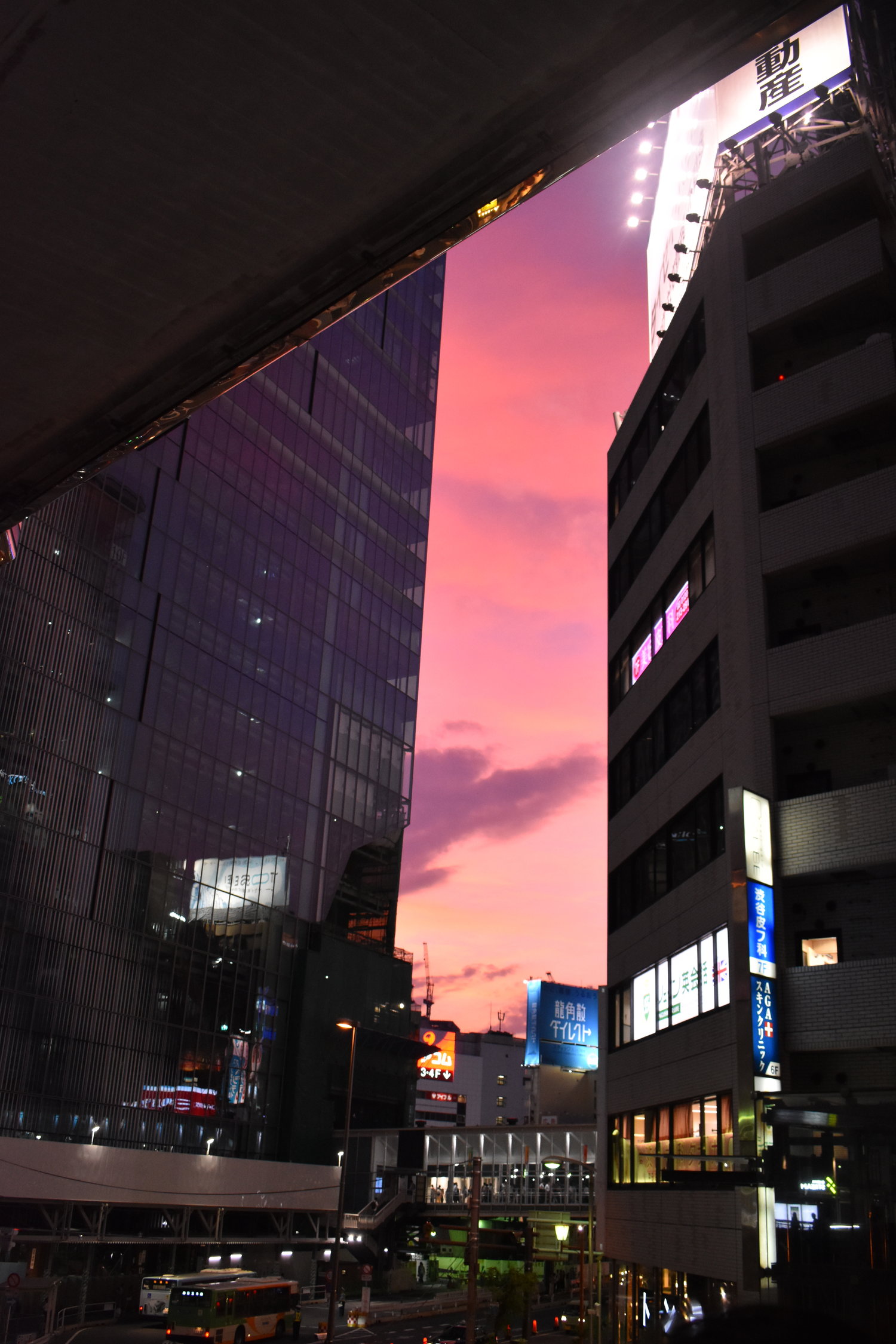
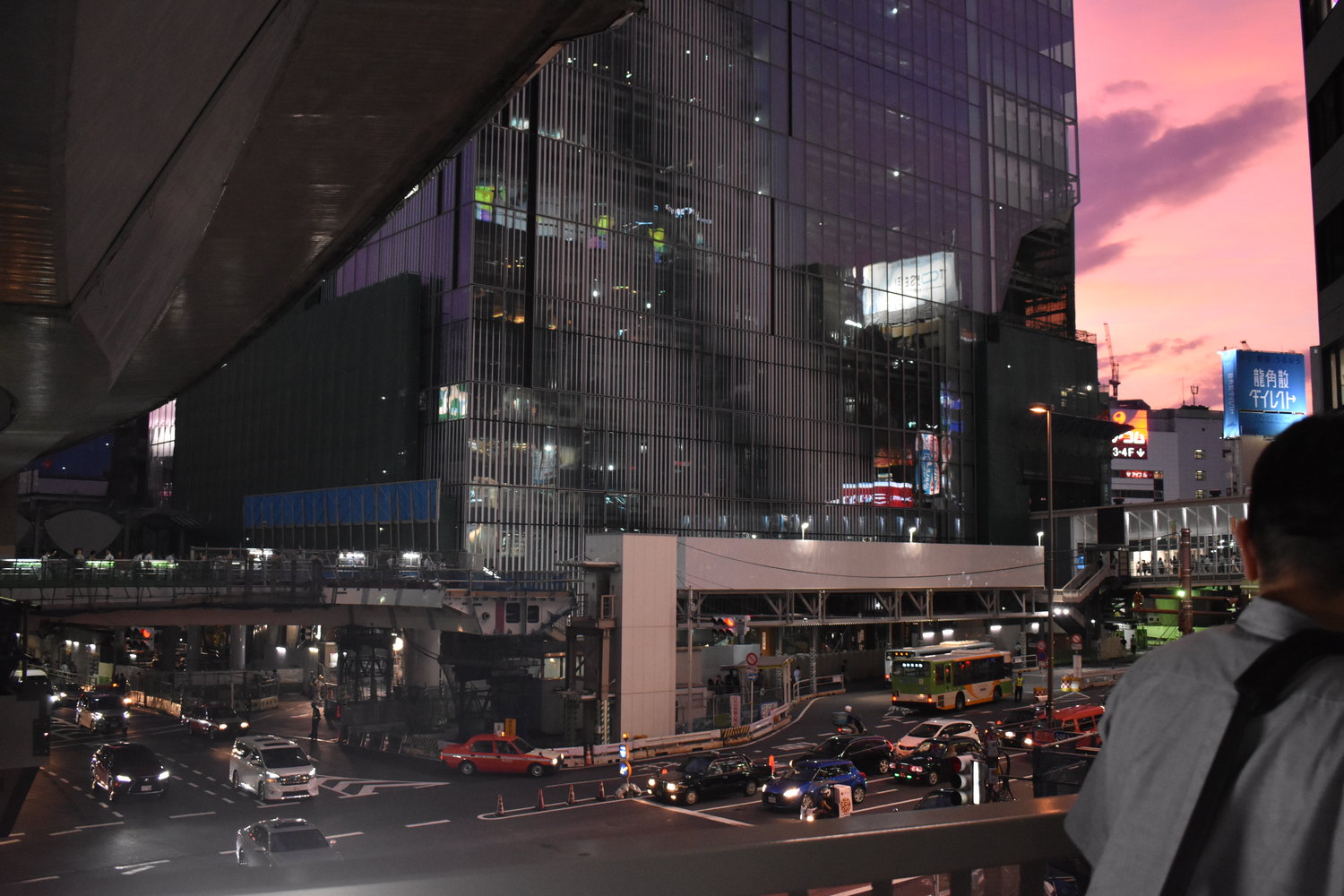
No filters, no editing, no nothing.
I feel like I should shake the hand of my opponent. Well played, Shibuya.
5: (not) Lost
July 21, 2018The relative safety of life in Japan will be a recurrent theme. Crime is really, really quite low. Most violent crime, for better or for worse, is confined to the yakuza or is committed by family members (and some of it quite extreme).
But for the most part, we don't have to look over our shoulders. Wallets in back pockets basically stay there, are not removed by anyone other than their rightful owners.
And there is something quite magical that happens when our possessions try to wander off on their own.
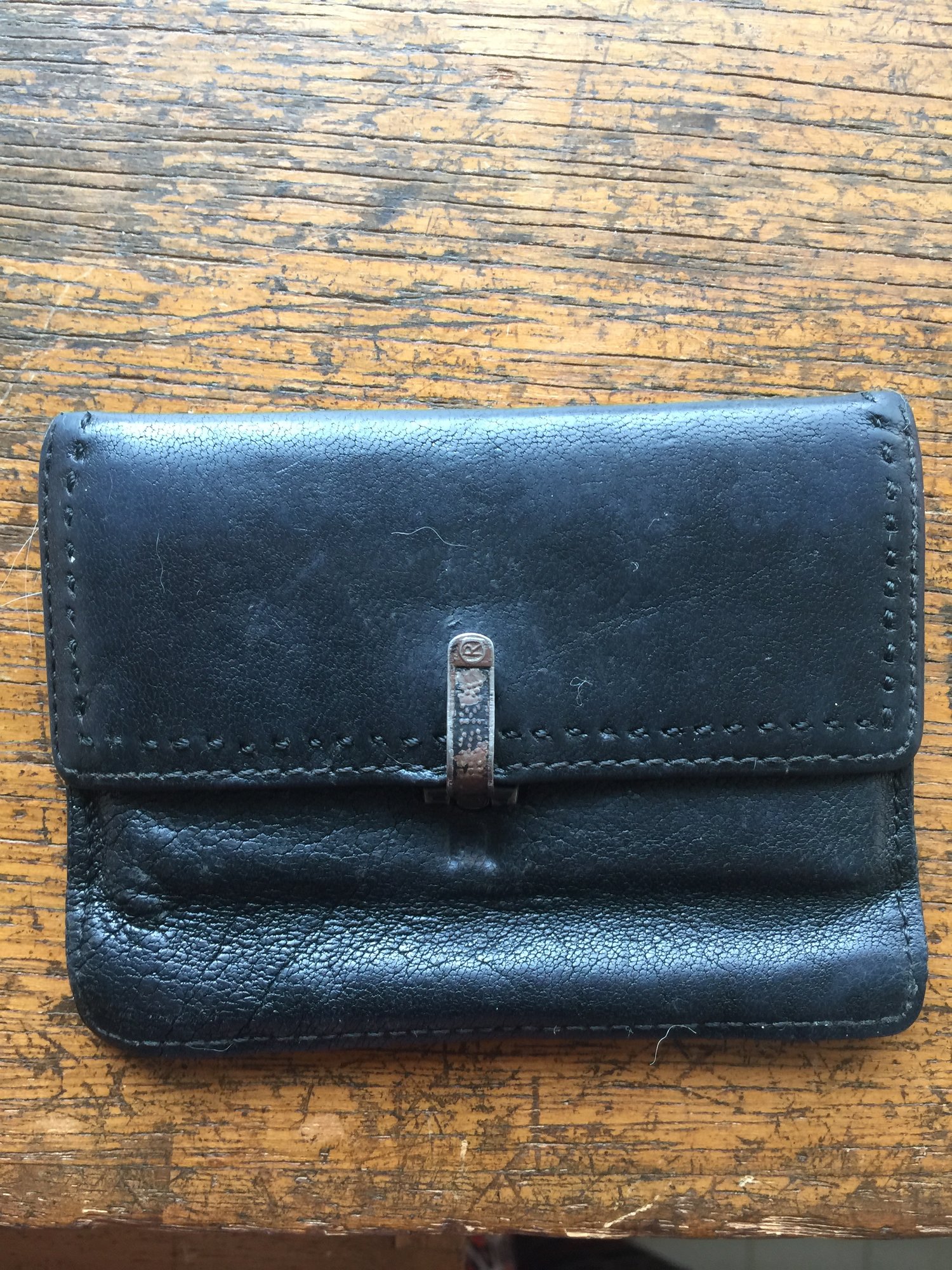
This is my card case. It has identified as mine for at least 10 years, if not more. My friend Patrick Stephan designed it, and he hasn't lived here in Japan for years and years.
Though it has been mine for 10 years, it probably has been in my possession for about nine years.
I have lost it many times. It has wandered off like an outdoor cat, lived a different life for awhile and then come back to me. Always.
It's pretty significant that in Japan, if you leave your phone on the train (did it) or in a taxi (friends did it) or your laptop in a taxi (friend did it) or your shoemaking gear on the top rack of the subway (totally did that), 9 times out of 10, you will be reunited with it. Kind souls bring your lost material children to the police boxes and lost and found. They hang stray keys on fences, lonely solo baby shoes on post boxes. Wallets come back with cards and sometimes even cash untouched.
My card case went for a walk sometime in early 2011 and failed to come home. It had run away before and come back. I had counted my blessings then, but as time passed, I became less and less hopeful.
The great earthquake came and kind of changed everything forever (that's a different post). I actually forgot about the case.
That summer, typhoon season ramped up pretty early. One had just battered through town, dumping a deluge of rain and blustery winds. It was July. The day after a typhoon is always clear and very, very hot. I took the 8-min walk to the subway very slowly, so as not to open the sweat spigot full blast. And then I came upon this
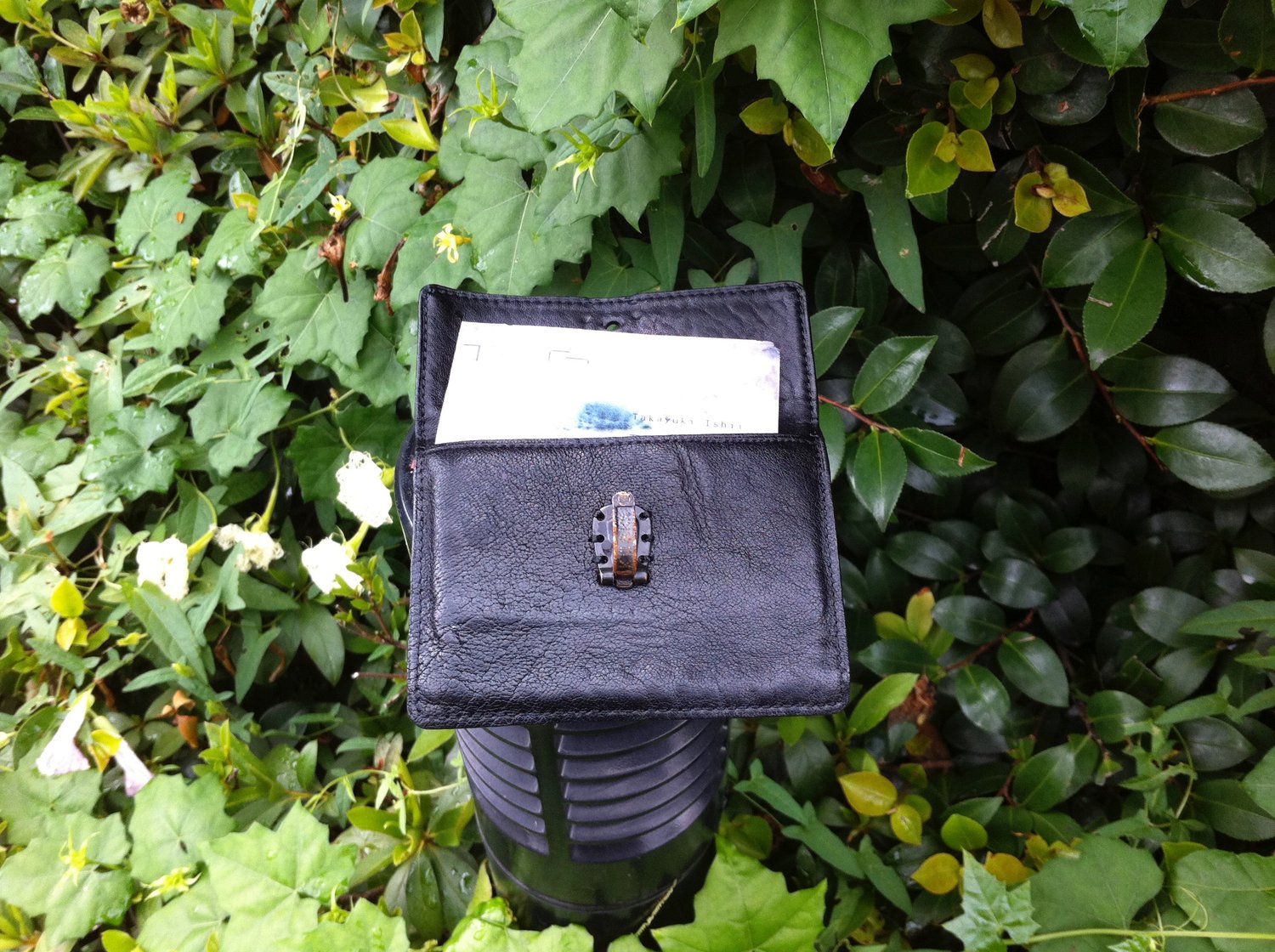
Perched atop a hip high garden lamppost, was my card case. Exactly like this. It was damp, and the cards inside were all worthless. But still, it was there! In a place I passed twice every weekday.
I still do not know what amount of kismet was necessary to make our reunion a reality. I don't know if the neighbors who had seen me pass on the way to work guessed the case belonged to me because of my foreign name. I still don't know what kind of adventure the case had been on for all of that time. It would have been impossible that the case had been there longer than a few hours; it would have been blown into the bushes by the previous day's storm.
No matter. We are still together because of the honesty and thoughtfulness of the 37.8 million people I share the Tokyo metropolitan area with. Go figure.
6: Opposite Platform
July 23, 2018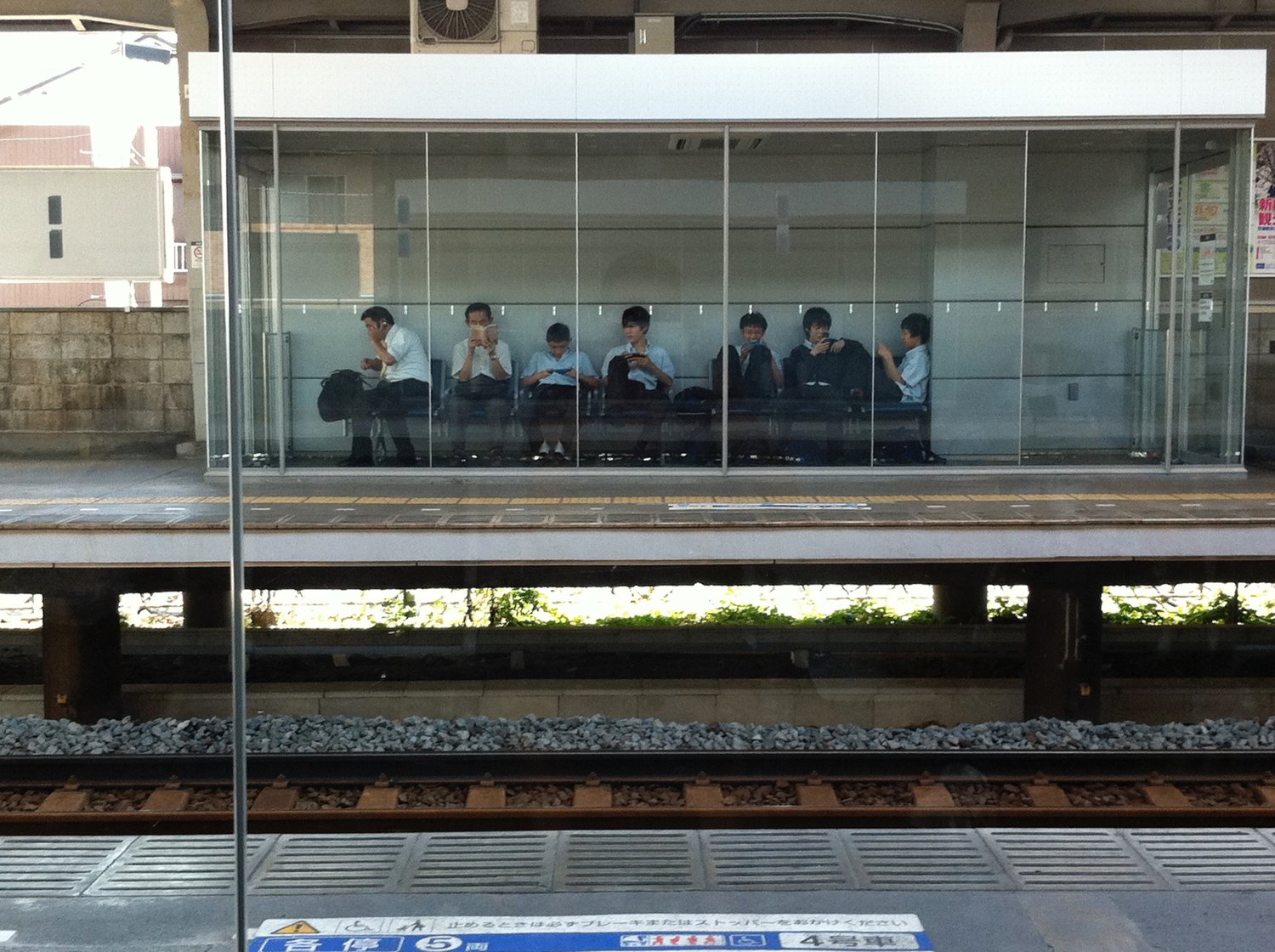
One small glass box on each platform is climate controlled.
7: Too Much Peace
July 28, 2018Quite often, you'll hear people say a compound word "Heiwa sugiru". Translated most literally, it means too much peace, or too peaceful. It is a lucky thing to complain about! Usually, it is trotted out when talking about Japan's supposed fading relevance. Punctuates the odd story that will make headlines because well frankly, there isn't a whole lotta bad shit going down all the time.
Today's case in point
“Police responded to multiple reports of the sound of something repeatedly the hitting windows of a Sapporo, Japan condominium in the wee hours on Friday. Residents reported that the window-thrashing lasted the better part of an hour.— FNN Prime News, July 27, 2018
Arriving on the scene, police found octopus suckers scattered on the street in front of the building. Upon further investigation, the head and arm of the octopus were found in the gutter nearby.”
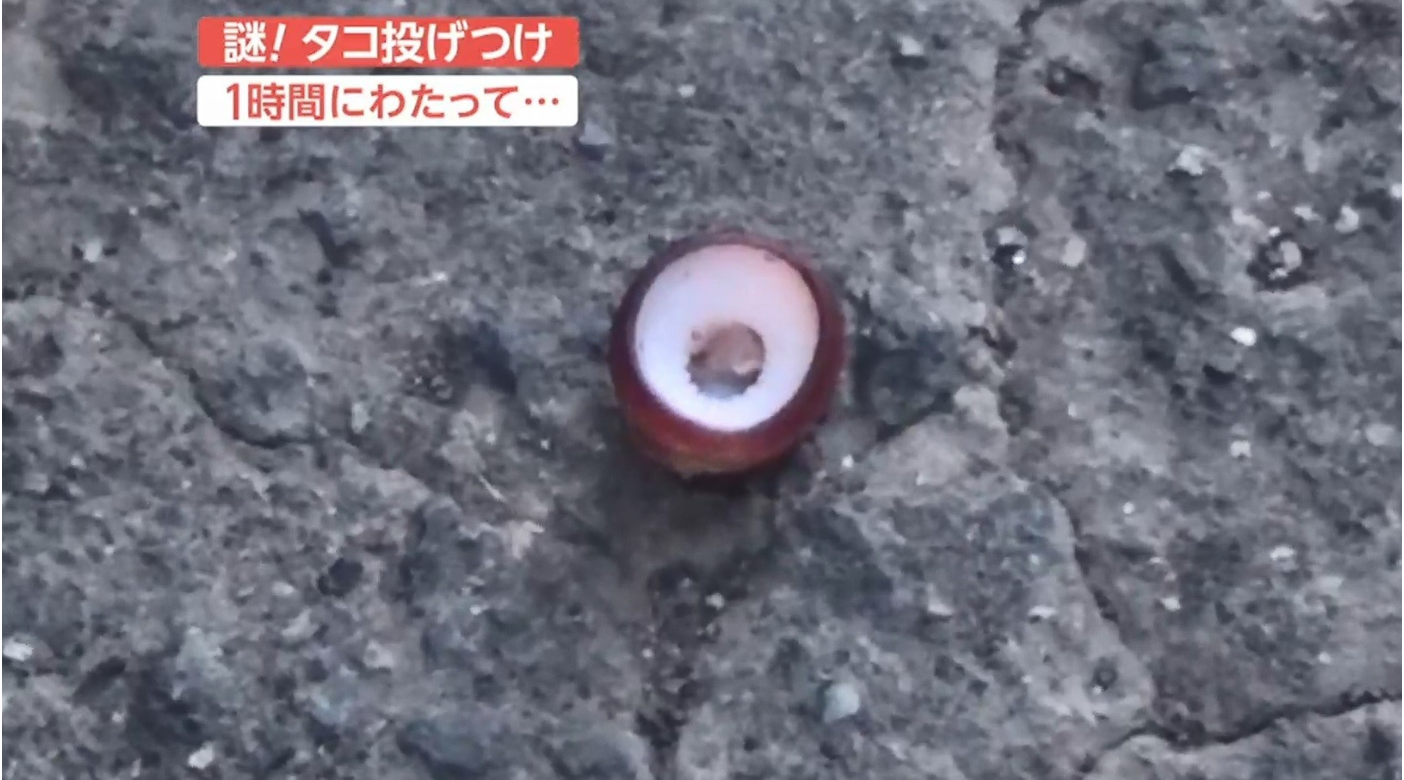 photo courtesy of FNN Prime News, via Yahoo! Japan
photo courtesy of FNN Prime News, via Yahoo! Japan1. Someone spent an hour hurling an octopus at the windows of a condominium late at night.
2. This is news.
3. I am grateful to have lived in a country with such peace for so long.
![]() This summer's theme at Jiyugaoka "Sweets Forest", a kind of dessert amusement park.
This summer's theme at Jiyugaoka "Sweets Forest", a kind of dessert amusement park.
Jiyugaoka is a neighborhood about 15 minutes away from Shibuya by public transport. It has, at least since the bubble, been ranked as one of the most desirable places to live in Japan.
Jiyugaoka is an odd hybrid of Disneyland and Park Slope. Everywhere 4WD doggie buggies and baby prams, ladies who lunch, tons of upscale junior high school students and tourists in equal throngs. Now there's even a hip 'yaoyasan' (green grocer) that sells obscure vegetables grown by unreasonably handsome people who might have left their prestigious ad/consulting firms to go back to their families' farms and help them survive. Hey, I am not knocking it.
Suffice it to say-- the area is fragrant of privilege, whether it be sinister or innocent--inherited or aspirational.
My day job used to be here.
2. This is news.
3. I am grateful to have lived in a country with such peace for so long.
8: Jiyugaoka
August 18, 2018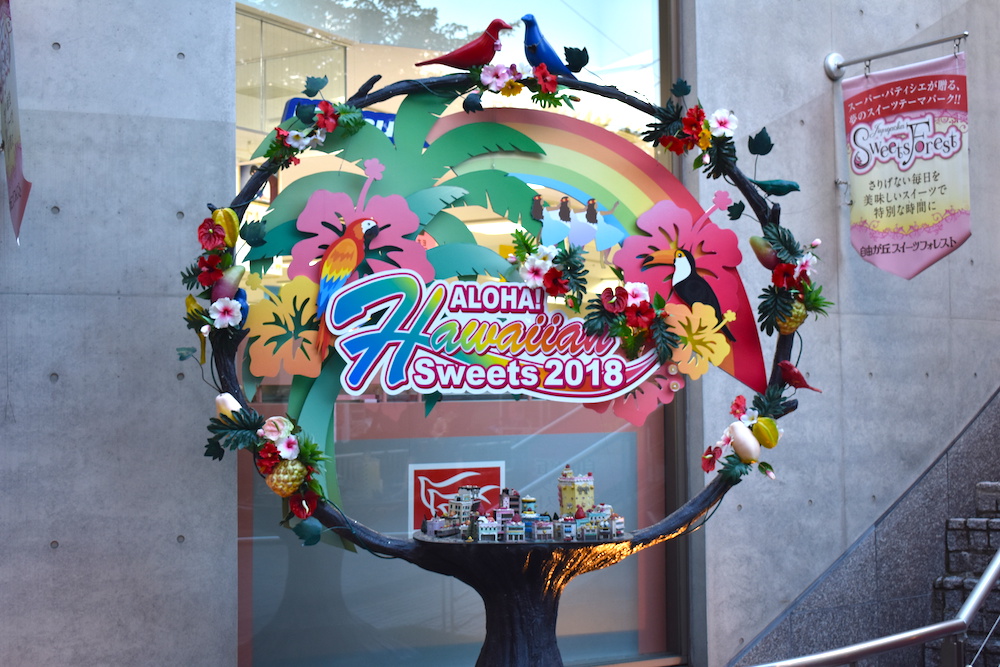 This summer's theme at Jiyugaoka "Sweets Forest", a kind of dessert amusement park.
This summer's theme at Jiyugaoka "Sweets Forest", a kind of dessert amusement park.Jiyugaoka is a neighborhood about 15 minutes away from Shibuya by public transport. It has, at least since the bubble, been ranked as one of the most desirable places to live in Japan.
Jiyugaoka is an odd hybrid of Disneyland and Park Slope. Everywhere 4WD doggie buggies and baby prams, ladies who lunch, tons of upscale junior high school students and tourists in equal throngs. Now there's even a hip 'yaoyasan' (green grocer) that sells obscure vegetables grown by unreasonably handsome people who might have left their prestigious ad/consulting firms to go back to their families' farms and help them survive. Hey, I am not knocking it.
Suffice it to say-- the area is fragrant of privilege, whether it be sinister or innocent--inherited or aspirational.
My day job used to be here.
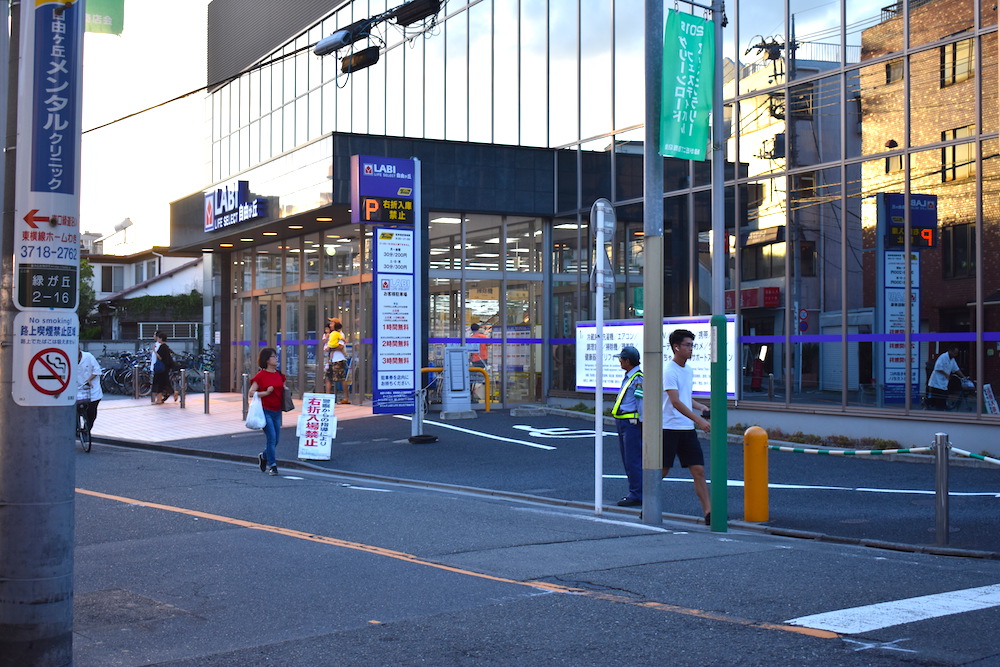
Jiyugaoka Labi. Japanese electronics stores are another level of amusement park.
One evening, after said day job, I made my way by bicycle to the local electronics emporium. There is the all-too rare ample free bicycle parking in front, which I knew very well, but managed to breeze past the entrance as the shop had blocked the far side for the season. Realizing my mistake, I stopped the bicycle with the front wheel angled slightly into the road to look over my shoulder, making sure I was clear to turn around.
All of the streets in Jiyugaoka are very narrow. Too narrow, in fact, for the thicket of pedestrian, canine, cycling, and outsized Porsche Cayenne traffic making the rounds. I noticed headlights coming my direction, probably a half a block off, and decided to wait until the car passed. Very distinctly, I remember thinking, "He's not going to hit me. He doesn't have to." I glanced down again at my front wheel just to confirm that I was not at all in the way.
Before I could look up again, I heard the sound, kind of like a soccer ball hitting the side of a metal suitcase at goal kick speed. That slow motion thing is real. I had just started training for a marathon, and having just enough time to think of my legs, I jumped.
Next thing I knew, I was directly in front of the automatic doors to the shop, with my belongings splayed and rolling away from me on the slight incline. To my right, I could see a woman and her son rushing toward me, and to the left, I saw the taxi at the end of the block (the entrance to the shop is in the middle of the block) and saw his brake lights flicker on as he passed through the next intersection, screeching to a halt somewhere in the block beyond.
There were now more people around me as I was blocking the entrance. The woman with her son began talking to me in English, telling me she had seen everything, that I should lie down. A few bystanders began to gather my things.
The taxi driver made his way back to the front of the shop slowly. He didn't speak to me. The woman was now quite angry with him, asking him what he had been thinking about in Japanese. She paused to call the police, who must have teleported to the scene.
I was shaken, but not really hurt.
The police asked the taxi driver what had happened, and he opened with ”外人ですから。。。” Literally, "Well, you know, she's a foreigner, so..." at which point I asked him (also in Japanese),"I'm a foreigner so, what?" He did seem a bit surprised that I knew what he was saying, and abruptly gave up on playing that card.
The woman, my well-doing bystander, leaned in on him at that point. I let her do all of the work, and sat there surrounded by my stuff thinking about the 13 years I had already spent in the country, learning the language, paying taxes, marrying a local, making friends. As advanced as Tokyo (and all of Japan, for that matter) is, it is still hopelessly behind when it comes to xenophobia. I wondered if the police would have a similar bent, and if I would be forced to pay for the damage to the taxi or something ridiculous like that.
The policeman eyed both of us like we were thieves. His partner walked to where the taxi was stopped, walked around it, fingered the minimal damage to the fender and grill. His head suddenly snapped up, and he jogged back to us. He asked the taxi driver if he realized he had hit someone. The driver responded, "Yes, of course."
"Then why did you wait so long to stop? The rubber tracks on the road don't start for a hundred meters or so."
Later, after the ambulance ride and x-rays, my husband and I met up with the taxi driver at the police station. He asked me not to file a specific kind of complaint, the kind that would damage his standing at his company and leave a more serious mark on his record. He was of advanced age, and I did start to pity him a bit.
"Was there oncoming traffic?' my husband asked.
"No."
"Then why did you hit my wife?"
"I didn't want to cross the center line."
One evening, after said day job, I made my way by bicycle to the local electronics emporium. There is the all-too rare ample free bicycle parking in front, which I knew very well, but managed to breeze past the entrance as the shop had blocked the far side for the season. Realizing my mistake, I stopped the bicycle with the front wheel angled slightly into the road to look over my shoulder, making sure I was clear to turn around.
All of the streets in Jiyugaoka are very narrow. Too narrow, in fact, for the thicket of pedestrian, canine, cycling, and outsized Porsche Cayenne traffic making the rounds. I noticed headlights coming my direction, probably a half a block off, and decided to wait until the car passed. Very distinctly, I remember thinking, "He's not going to hit me. He doesn't have to." I glanced down again at my front wheel just to confirm that I was not at all in the way.
Before I could look up again, I heard the sound, kind of like a soccer ball hitting the side of a metal suitcase at goal kick speed. That slow motion thing is real. I had just started training for a marathon, and having just enough time to think of my legs, I jumped.
Next thing I knew, I was directly in front of the automatic doors to the shop, with my belongings splayed and rolling away from me on the slight incline. To my right, I could see a woman and her son rushing toward me, and to the left, I saw the taxi at the end of the block (the entrance to the shop is in the middle of the block) and saw his brake lights flicker on as he passed through the next intersection, screeching to a halt somewhere in the block beyond.
There were now more people around me as I was blocking the entrance. The woman with her son began talking to me in English, telling me she had seen everything, that I should lie down. A few bystanders began to gather my things.
The taxi driver made his way back to the front of the shop slowly. He didn't speak to me. The woman was now quite angry with him, asking him what he had been thinking about in Japanese. She paused to call the police, who must have teleported to the scene.
I was shaken, but not really hurt.
The police asked the taxi driver what had happened, and he opened with ”外人ですから。。。” Literally, "Well, you know, she's a foreigner, so..." at which point I asked him (also in Japanese),"I'm a foreigner so, what?" He did seem a bit surprised that I knew what he was saying, and abruptly gave up on playing that card.
The woman, my well-doing bystander, leaned in on him at that point. I let her do all of the work, and sat there surrounded by my stuff thinking about the 13 years I had already spent in the country, learning the language, paying taxes, marrying a local, making friends. As advanced as Tokyo (and all of Japan, for that matter) is, it is still hopelessly behind when it comes to xenophobia. I wondered if the police would have a similar bent, and if I would be forced to pay for the damage to the taxi or something ridiculous like that.
The policeman eyed both of us like we were thieves. His partner walked to where the taxi was stopped, walked around it, fingered the minimal damage to the fender and grill. His head suddenly snapped up, and he jogged back to us. He asked the taxi driver if he realized he had hit someone. The driver responded, "Yes, of course."
"Then why did you wait so long to stop? The rubber tracks on the road don't start for a hundred meters or so."
Later, after the ambulance ride and x-rays, my husband and I met up with the taxi driver at the police station. He asked me not to file a specific kind of complaint, the kind that would damage his standing at his company and leave a more serious mark on his record. He was of advanced age, and I did start to pity him a bit.
"Was there oncoming traffic?' my husband asked.
"No."
"Then why did you hit my wife?"
"I didn't want to cross the center line."
